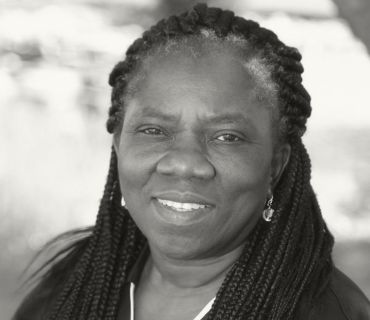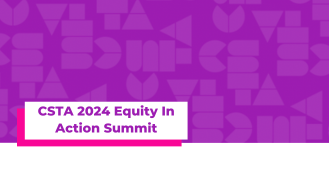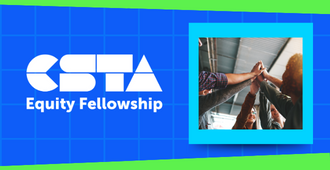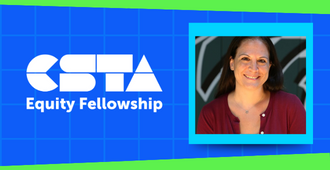
Chinma Uche is a Math and Computer Science (CS) teacher at the Academy of Aerospace and Engineering (AAE).
Full Story
Chinma Uche is a Math and Computer Science (CS) teacher at the Academy of Aerospace and Engineering (AAE). She has over 30 years of teaching experience and was a founding member of CSTA Connecticut Chapter, serving as Chapter President from 2009-2018. Most recently, Uche has been focused on CS advocacy at the state level, serving as a co-State lead for ECEP Connecticut. You can connect with her on Twitter or LinkedIn.
As we transition into spring and summer in North America, what does this season change mean for you?
I’m headed into a busy season with AP exams and classes are wrapping up as we approach the end of the school year. Personally, as a Christian, this is an important time, after Easter, symbolizing a time of period of newness and freshness. I’m trying to focus on time outside, and find a balance with time in and out of school.
You mentioned AP exams, what does this year look like for AP CS exams, and what has changed since 2020?
Last spring/summer, we were still trying to figure out what the closure of schools meant for our students and the exams. So many plans were changed. We learned to take things as they come. The expectations and structures have changed so much for many students and teachers that it is difficult to generalize our experiences. With regards to the AP exams, there is some lingering doubt about the level of preparation or readiness of students for these exams. There are gaps in knowledge for some students. Currently, I’m trying to help my students make up for lost time and explain the exam expectations. Are they ready? For some, yes, and for others not so much. As a teacher, I’m trying to prepare them to adjust to the information we have, cope as best they can, and make needed adjustments as we approach the exam date.
Do you think the AP CS exams are equitable for students this year, given all the last year’s challenges?
Given the way last school year ended, some students entered this year without adequate background. Some lacked access to needed technology. While many schools have addressed issues of access to technology, a significant amount of time has been lost. For me, the College Board has done an excellent job of managing expectations and explaining the rationale for their action. It is understandable that they want to give a full exam. You should only be given AP credit if you have the required knowledge; if you don’t have that knowledge, no credit should be given. Success in AP classes equates often to college credit being awarded. As colleges do not want to give credit to students who are not well prepared, the AP exam has to cover the full curriculum. While this may not sound equitable, students have the chance to retake these classes in college if the need arises. I would say that teachers are working hard to get students to a level of confidence with the material, and support them to do their best. Luckily, CS educators are better prepared than more teachers to adapt to these challenging times.
Do you predict there will be fewer students taking AP CS exams?
I really do not know. Things are so wildly different in many schools. Many schools and classes have reduced the number of minutes that lessons last so some students will not be ready. Whether or not they take the exam depends on other local factors. I encourage my students to take the AP exam because the act of preparing for the exam equips the students with useful skills. For many teachers and students, it’s challenging to cover the required curriculum. The idea of hope and guidance for students is vital. On a positive note, I have seen some students step up in these challenging times. However, people’s family circumstances are not the same. Considering the pandemic, loss of life, and inequity occurring, schools, the College Board, and students are doing their best. I would not judge students, this year, by only their level of academic achievement.
Can you clarify what you mean by CS being better prepared for adapting and discussing inequity?
In CS education, we have been having conversations about inequity, social justice, and national preparedness for a long time. It was CSTA that brought the concept of IDEA (Inclusion, Diversity, Equity, and Access) into my vocabulary. The discussion led to most of our curriculum being written with an eye to equity and hosted online. Most CS educators have had an online portal for hosting curriculum and managing assessments. Earlier this year, our district held a Racial and Social Justice Week, where teachers were asked to include information about justice in their curriculum. CS made it easy for me to find tools and resources to have needed conversations. My students enjoyed the conversations and aired their views. Students have a role to play in these discussions. We need to encourage them to take a leading role in being anti-racist and addressing equity issues. Students need to combat microaggressions, speak up against discrimination and recognize the benefits that diverse backgrounds bring to a room.
Have you seen the recent documentary Code Bias or talked about AI with your students?
I haven’t seen the film, but I plan to watch it soon! It’s essential to speak to your students about AI and racial bias. Students are listening, and they are leaders of tomorrow. I recommend teachers review some lessons/videos that Code.org has on AI. My students found them fun and relatable, and great conversation starters. Our students are the programmers of tomorrow and creators of tomorrow’s tools so engaging them in these discussions will make for a better future. If we don’t want a world where oppression is valued, we need to be intentional about creating a world where individuals are valued and loved. I’m hoping that we are all working hard to create such a world where we are looking out for each other.
Can you talk about accountability in having equity conversations in CS?
The AI resources that I spoke about illustrate how the quality and quantity of data affects AI decision-making. In our current society, where systematic racism is the norm, there is the need to address the many facets of racism that are often not addressed. Racism is often addressed in a way that seems to imply that the classroom teacher is the one propagating racism. The truth is that the classroom teacher is a member of society and a product of their environment. Each one of us has a role to play in recognizing and advocating for change and equitable access to resources for all students. We need to be having discussions not just with students, but with parents, administrators, and the wider community. Let’s be clear; teachers are not the ones making inequitable policies. We all need to use whatever platform we have to train ourselves and to train our children and students to be antiracists.
In March 2021, CSTA held an Equity in Action Summit, intending to have teachers create Equity Action Plans. What else do you think teachers and CS advocates should be doing?
Yes, I attended the summit and it was great. Teachers shared tools for creating equitable experiences for their students in CS. A one-day summit is not enough. It’s not enough to tell people what to do during one session or the other; there is the need to create the space and give people the time to reflect on their learning and plan what to change. We need continuous dialogue about social justice beyond lesson content, lesson plans, and issues of recruitment. We need community involvement, community advocacy, legislative input, and others. It will be great if CSTA can help facilitate forums where these conversations can take place. There needs to be a collective buy-in to the values of equity. It benefits all. We need to ask: Who can make changes in your school or community? What can you do differently as an individual? We need to recognize that we work in an ecosystem that needs to change. The inequity is real and has to be addressed. Teachers are in a difficult position and need support, not criticism.
What’s an assumption you made in CS that turned out inaccurate?
I have been an advocate for CS education for all students since 2006, knowing that it provides access to 21st-century skills. Given all the effort by the National Science Foundation and others to promote CS, I assumed that people know the value of CS. I have been greatly mistaken. With the COVID-19 pandemic and the dependence on technology in the last 12 months, it is still surprising that some schools are still not teaching CS. Every person needs to recognize that CS is an essential and foundational piece in education. Many years ago, I assumed that getting state-level policy changes were sufficient for getting CS to all students in my state. I have come to understand that systematic change is a lot more difficult. I remember celebrating a 2015 CS bill being passed and signed into law by our Governor. I remember, at our CSTA meeting, having a small cake to celebrate the law. We were later to understand the position of an unfunded mandate which is often ignored. We currently have a 2019 law in my state that is also unfunded. Our CSTA chapter advocated for that bill, and leveraged community support. While we advocate for funding, new tools are being developed that require changes in K-12 curriculum. What room are we making for AI4K12, Quantum4K12, etc? How do we reach the critical players for policy changes? How do we get funds to districts to implement already passed laws?
Your positive energy and kindness are admirable; how have you managed Zoom fatigue or burnout these days?
I’ll be honest that I don’t think my students are using me as much as they could be. I recognize that this period is difficult for students so we have to be strong for them. Students are not always able to communicate the hurdles they are facing. I focus on telling my students that their teachers are excited to work with them. I believe that if students spoke more to their teachers, they would find the spark to inspire each other and avoid Zoom fatigue. I am looking forward to the new school year where hopefully we will use the lessons of this school year to support all our students.



